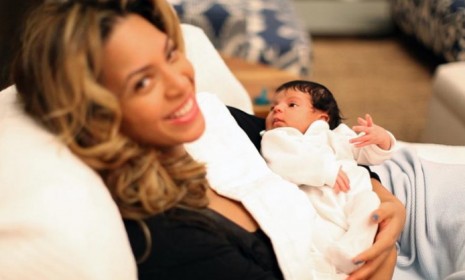Can you trademark your baby's name?
Beyonce and Jay-Z take the legal route to ensure that nobody steals Blue Ivy Carter's name. For ordinary parents, though, the quest for a unique moniker is more complicated

A free daily email with the biggest news stories of the day – and the best features from TheWeek.com
You are now subscribed
Your newsletter sign-up was successful
This winter, Jay-Z and Beyonce took the "cutthroat" competition to coin the most original baby name to a new level, when they trademarked "Blue Ivy" to ensure other new moms and dads wouldn't copy the name of their new daughter, born Jan. 7 in New York City. Are we in for a wave of parents staking similar claims on baby-name turf? Here, a brief guide:
Why did Beyonce and Jay-Z get so protective about a name?
It's all about the brand. The recording stars most likely reserved the name of their wee A-lister "for a future line of baby clothing or kiddie items with the label Blue Ivy Carter on it," says tax lawyer and mom Jacoba Urist at MSNBC. So if you're hoping to "capitalize on their kid's fame and open up your own Blue Ivy boutique," you're out of luck.
The Week
Escape your echo chamber. Get the facts behind the news, plus analysis from multiple perspectives.

Sign up for The Week's Free Newsletters
From our morning news briefing to a weekly Good News Newsletter, get the best of The Week delivered directly to your inbox.
From our morning news briefing to a weekly Good News Newsletter, get the best of The Week delivered directly to your inbox.
Can non-celebrities follow their lead?
Technically, yes. But you'll gain little advantage, at least "99.9 percent of the time," Brett Frischmann, an expert in intellectual property and internet law at Cardozo School of Law, tells MSNBC. A trademark doesn't stop other parents from giving their kid your child's name. It just stakes a claim in the business world; it only becomes an issue if they try to profit off the name. "You could always name your child Delta and the airline couldn't sue you," unless you built a rival, identically named airline around your new offspring.
What's an ordinary mom or dad to do?
Relatively rare names can catch fire quickly. The names Sophia and Jacob, considered rather "original" a decade or so ago, were the most popular names in 2011, according to the Social Security Administration. So many parents are opting for excessively creative spellings to make sure nobody "steals" their baby name, the STFU Parents blog at Mommyish said in December. (How many "Maddilhyns" do you know?) Today's parents will stop at nothing, it seems, to come up with unique names, "so that their kids have a better chance of being 'noticed' as they go through life."
A free daily email with the biggest news stories of the day – and the best features from TheWeek.com
-
 Political cartoons for February 15
Political cartoons for February 15Cartoons Sunday's political cartoons include political ventriloquism, Europe in the middle, and more
-
 The broken water companies failing England and Wales
The broken water companies failing England and WalesExplainer With rising bills, deteriorating river health and a lack of investment, regulators face an uphill battle to stabilise the industry
-
 A thrilling foodie city in northern Japan
A thrilling foodie city in northern JapanThe Week Recommends The food scene here is ‘unspoilt’ and ‘fun’